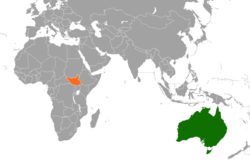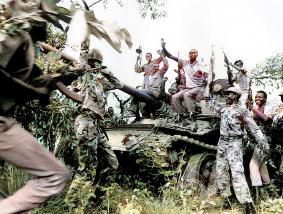 | |
Australia | South Sudan |
|---|---|
Official relations exist between Australia and South Sudan. While the two countries do not have official embassies in each other's nation, they share a strong and common tie. [1]
 | |
Australia | South Sudan |
|---|---|
Official relations exist between Australia and South Sudan. While the two countries do not have official embassies in each other's nation, they share a strong and common tie. [1]
Both were formerly parts of the British Empire, and the English is the main language in both nations.
Throughout the Sudanese Civil Wars (1955–1972 and 1983–2005), many South Sudanese refugees had sought refuge in Kenya. Australia was one of the first countries to announce its support in resettling South Sudanese refugees. Thus, the South Sudanese community was the first-ever organized African community in Australia, and also the largest African diaspora in that country. [2]
When South Sudan gained independence in 2011, Australia was one of the first countries to recognize it. However, due to the ongoing South Sudanese Civil War, Australia was forced to play a peacekeeping role in the new nation. And because of the large South Sudanese diaspora in the country, Australia was subsequently asked to play a larger role. [3]
South Sudanese refugees first arrived in Australia during the 1990s. [4]
While the South Sudanese community in Australia tends to be well-integrated, racism remains an issue in the country. Criminal activity by South Sudanese gangs prompted hostility and xenophobia against South Sudanese by Australians, creating fear for South Sudanese people in the country. [5] Racial issues also played a role in the cancellation of the South Sudanese Australian Basketball Association Summer Slam in 2018. [6]
Nonetheless, a number of famous South Sudanese Australians had taken steps to slow anti-South Sudanese sentiment in Australia. Notable figures include Awer Mabil, who won a FIFA global award for his charity work with South Sudanese refugees in Kenya, [7] Thomas Deng, Abraham Majok and Bruce Kamau.

Jonglei State is a state of South Sudan with Bor as its centre of government and the biggest city. Jonglei state comprises nine counties: Bor, Akobo, Ayod, Uror, Duk, Nyirol, Pigi, Twic East, and Fangak. Jonglei State is the largest state by area before reorganisation, with an area of approximately 122,581 km2, as well as the most populous according to the 2008 census conducted in present-day South Sudan's second period of autonomy. The boundaries of the state were again changed as a result of a peace agreement signed on 22 February 2020.

The Second Sudanese Civil War was a conflict from 1983 to 2005 between the central Sudanese government and the Sudan People's Liberation Army. It was largely a continuation of the First Sudanese Civil War of 1955 to 1972. Although it originated in southern Sudan, the civil war spread to the Nuba mountains and the Blue Nile. It lasted for almost 22 years and is one of the longest civil wars on record. The war resulted in the independence of South Sudan 6 years after the war ended.

The Lost Boys of Sudan refers to a group of over 20,000 boys of the Nuer and Dinka ethnic groups who were displaced or orphaned during the Second Sudanese Civil War (1987–2005). Two million were killed and others were severely affected by the conflict. The term was used by healthcare workers in the refugee camps and may have been derived from the children's story of Peter Pan by J. M. Barrie. The term was also extended to refer to children who fled the post-independence violence in South Sudan in 2011–2013.
African immigration to the United States refers to immigrants to the United States who are or were nationals of modern African countries. The term African in the scope of this article refers to geographical or national origins rather than racial affiliation. Between the Immigration and Nationality Act of 1965 and 2017, Sub-Saharan African-born population in the United States grew to 2.1 million people.
African Australians are Australians of sub-Saharan African ancestry, including naturalised Australians who are immigrants from various regions in sub-Saharan Africa and descendants of such immigrants.

Australian rules football in Africa is most organised in South Africa, although there are programs under development in many African nations including Botswana, Egypt, Ghana, Kenya and Zimbabwe and there are plans to introduce the sport into more African countries.
Sudanese Americans are Americans of Sudanese ancestry or Sudanese who have American citizenship. Sudanese Americans may also include children born in the United States to an American parent and a Sudanese parent. Many Sudanese immigrated to the United States in the 1990s as war refugees, escaping from civil war in Sudan. In the 2012 American Community Survey, 48,763 people identified as Sudanese or Sudanese Americans who—or whose ancestors—have emigrated from their native land to the U.S. in the 1980s, 1990s, and 2000s.
Sudanese in the United Kingdom including Sudanese-born immigrants to the UK and their British-born descendants are an extremely diverse national group, especially in terms of political and religious views. It is thought that the UK is home to the oldest Sudanese diaspora in the Western World, as well as one of the largest. Sudanese migrants to the UK have traditionally included professionals, business people and academics, and more recently have included asylum seekers fleeing Sudan's second civil war. Sudanese people live in many of the UK's largest cities and towns.
Sudanese refugees are persons originating from the country of Sudan, but seeking refuge outside the borders of their native country. In recent history, Sudan has been the stage for prolonged conflicts and civil wars, as well as environmental changes, namely desertification. These forces have resulted not only in violence and famine but also the forced migration of large numbers of the Sudanese population, both inside and outside the country's borders. Given the expansive geographic territory of Sudan, and the regional and ethnic tensions and conflicts, much of the forced migration in Sudan has been internal. Yet, these populations are not immune to similar issues that typically accompany refugeedom, including economic hardship and providing themselves and their families with sustenance and basic needs. With the creation of a South Sudanese state, questions surrounding southern Sudanese IDPs may become questions of South Sudanese refugees.

South Sudan, officially the Republic of South Sudan, is a landlocked country in Central Africa and politically grouped in Eastern Africa region. It is bordered by Ethiopia, Sudan, the Central African Republic, the Democratic Republic of the Congo, Uganda, and Kenya. Its population was estimated at 11,088,796 in 2023. Juba is the capital and largest city.

The culture of South Sudan encompasses the religions, languages, ethnic groups, foods, and other traditions of peoples of the modern state of South Sudan, as well as of the inhabitants of the historical regions of southern Sudan.

Awer Bul Mabil is a professional soccer player who plays as a winger for La Liga club Cádiz. Born as a South Sudanese refugee in Kenya, he represents the Australia national team.
Prostitution in South Sudan is legal but related activities such as soliciting or brothel-keeping are illegal.
The South Sudanese diaspora consists of citizens of South Sudan and descendants of South Sudanese origin residing abroad outside their homeland.
South Sudanese Americans are an ethnic group of Americans of South Sudanese ancestry, or South Sudanese people who have American citizenship. South Sudanese Americans can include American descendants to South Sudanese ancestors or South Sudanese immigrants who obtained an American citizenship.
South Sudanese Australians are people of South Sudanese ancestry or birth who live in Australia.
Thomas Jok Deng is a professional soccer player who plays as a central defender for J1 League club Albirex Niigata. Born a South Sudanese refugee in Kenya, he has represented the Australia national team.

South Sudan competed at the 2016 Summer Olympics in Rio de Janeiro, Brazil, from 5 to 21 August 2016. South Sudan had been an independent nation since 2011, but its civil war had delayed its membership with the International Olympic Committee until 2015, making 2016 its first official appearance at the Olympic Games. The country was offered three universality placements in athletics, as no South Sudanese athletes met the Olympic qualifying standards prior to the Games. Three athletes, two men and one woman, competed in three track and field events, but did not win any medals. The sole woman, Margret Rumat Hassan, was given a spot eight days prior to the start of the Games that had been allotted previously to Mangar Makur Chuot. This change was against the advice of the South Sudan Athletics Federation and was due allegedly to pressure from Samsung, for whom Hassan had appeared in an advertisement. The flagbearer for both the opening and closing ceremony was Guor Marial, a marathon runner who, then unable to represent South Sudan, had competed as an Independent Olympic Athlete in 2012. Five South Sudanese nationals also competed as members of the Refugee Olympic Team.
South Sudanese refugees are persons originating from the African country of South Sudan, but seeking refuge outside the borders of their native country. The world's youngest independent country has a recent and troubled history of prolonged conflicts and ecosystem mismanagement such as overlogging, which has led to desertification. These forces have resulted not only in violence and famine, but also the forced migration of large numbers of the population, both inside and outside the country's borders. South Sudan was cited as the largest refugee crisis in 2016, being the world's third largest, followed by Syria and Afghanistan. As of 2022, the UNHCR estimated that there were 2.4 million refugees under its mandate originating from South Sudan, making the country the fifth largest source of refugees.
Deng Thiak Adut is a defence lawyer and refugee advocate in Western Sydney, Australia, and a former child soldier from South Sudan. His story is told in a popular short video by Western Sydney University, where he earned his law degree. He was named the 2017 New South Wales Australian of the Year.
{{cite web}}: CS1 maint: archived copy as title (link)